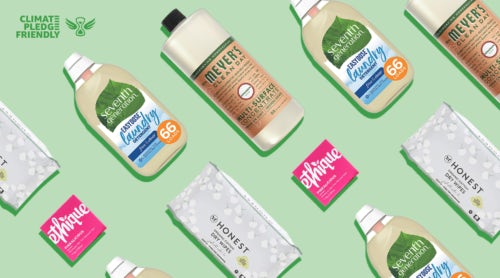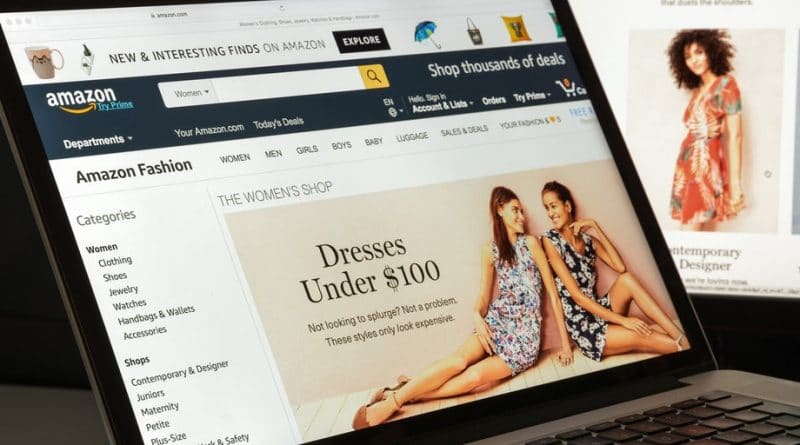Amazon Wants You To Know What Products Are Sustainable | Intelligence, BoF Professional
LONDON, United Kingdom — Amazon wants to become a destination for conscious consumers. This week, it will start labelling items on its US website with a winged hourglass to indicate they qualify as more environmentally friendly.
In the fashion world, retailers including Net-a-Porter, Farfetch, and Galeries Lafayette already highlight products and brands that meet certain ethical or environmental criteria. Selfridges and Zalando have gone a step further, committing to stop stocking products altogether if they aren’t up to the retailers’ minimum standards within the coming years.
All are tapping into growing consumer demand for sustainable products. In an April survey of European consumers by McKinsey, more than 60 percent of respondents said they considered the way brands promote sustainability as a factor in purchasing decisions. Now, the world’s largest online retailer – and one of the biggest apparel sellers – is joining the fray.
“A lot of retailers see sustainability as a competitive advantage in helping them attract new consumers, building engagement and loyalty,” said Elisa Niemtzow, vice president at nonprofit consultancy BSR. “It makes us feel good; it feels better to buy something when we have more information about how it was made.”
To qualify for Amazon’s new Climate Pledge Friendly label, products will need to have achieved at least one of nineteen certifications that guarantee the item has a reduced environmental impact. The company trawled through hundreds of sustainability accreditations to ensure its selection standards were robust.
A lot of retailers see sustainability as a competitive advantage.
Certifications that made the cut include Cradle to Cradle, Fairtrade, the Global Organic Textile Standard and clean chemistry standard Bluesign Product. The company also designed its own externally-verified certification to recognise products with a more efficient design, meaning shipping them requires less packaging and energy.
More than 25,000 products in categories including fashion, beauty and household goods will be included in the programme when it launches in the US, and Amazon is exploring launching in other countries in the future. The initiative is intended to make it easier for customers to discover more sustainable items, and encourage brands to produce more sustainable products, Amazon founder and chief executive Jeff Bezos said in a statement.

Amazon’s Climate Pledge Friendly label | Source: Alan Keane, Courtesy
The move comes as the e-commerce company ratchets up broader corporate efforts to address its own substantial environmental footprint. Last year, it co-founded The Climate Pledge, a corporate commitment to reach carbon neutrality by 2040. This year, it launched a $2 billion fund focused on supporting businesses and innovations that will help decarbonise the economy.
But the company has also faced criticism for the environmental toll it exacts. Piles of Amazon boxes have become a symbol of excess consumption through the pandemic, which has also drawn unflattering attention to working conditions in the company’s warehouses.
Last year, Amazon’s carbon footprint grew 15 percent to hit the equivalent of 51.2 million metric tons of carbon dioxide, though emissions fell relative to growth.
A company spokesperson pointed to Amazon’s ongoing commitment to improving its environmental impact, including its efforts to minimise waste, invest in recycling infrastructure and offer options for customers to reuse and repair old items.
The new labelling programme “expands our commitment to sustainable products, and it’s also in response to increasing customer demand and scientific consensus over the need for action now,” the spokesperson said.
Last year, Amazon’s carbon footprint grew 15 percent.
Some critics remain wary of labelling initiatives like the one Amazon is launching. Because products only have to meet one of the certifications the company is relying on, what qualifies as sustainable can be broad. An item could be labelled green because it’s certified to have reduced emissions, for example, even if it may be falling down in other areas. To make credible claims about products’ sustainability credentials, companies need to conduct life cycle assessments that really break down an item’s impact, said Dio Kurazawa, founding partner of sustainable supply chain consultancy The Bear Scouts.
“These labels are being used in place of an honest assessment of the impact embodied in a product,” said Maxine Bédat founder and director of sustainable fashion think tank the New Standard Institute. “It’s greenwashing.”
Amazon said items will be clearly labelled in shopping results and detailed sustainability information will be available on product pages. “We explicitly include that in the consumer experience,” an Amazon spokesperson said. “It’s very transparent how each product is included in the program.”
Nonetheless, the company faces a delicate balancing act to navigate the tension between growth and environmental impact as it seeks to rebrand as a destination for sustainable products. It’s not the only market the company is looking to break. It’s also redoubled its bid to establish a presence in luxury fashion this month.
Both reflect an ambition to attract customers looking for more than mere convenience.
Related Articles:
How Big Retailers Are Selling Sustainability

